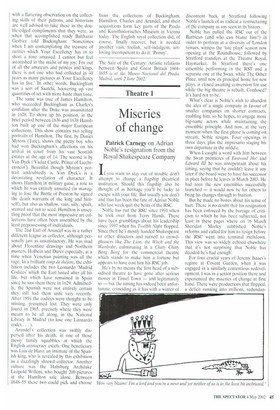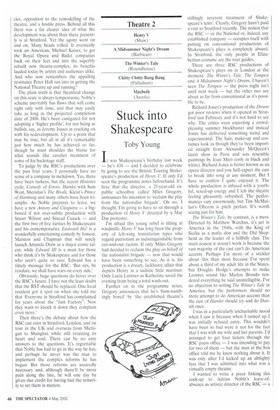Miseries of change
Patrick Carnegy on Adrian Noble's resignation from the Royal Shakespeare Company If you want to stay out of trouble don't attempt to change a flagship theatrical institution. Should this flagship also be thought of as heritage you'll be lucky to escape with your life. But usually you don't and that has been the fate of Adrian Noble who last week quit the helm of the RSC.
Noble has run the RSC since 1991 when he took over from Terry Hands. There have been grumblings about his leadership since 1997 when his Twelfth Night flopped. Since then he's mostly handed Shakespeare to other directors and turned to crowdpleasers like The Lion. the Witch and the Wardrobe, culminating in a Chitty Chitty Bang Bang for the commercial theatre which stands to make him a fortune but appears to have cost him his RSC job.
He's by no means the first head of a subsidised theatre to have gone after serious money in Tinsel Town — and legitimately so — but the timing has indeed been unfortunate, coinciding as it has with a winter of discontent back at Stratford following Noble's launch of as radical a restructuring of the company as any seen in its history.
Noble has pulled the RSC out of the Barbican (and who can blame him?) in order to perform at a diversity of London venues, witness the 'late plays' season now opening at the Roundhouse, followed by Stratford transfers at the Theatre Royal, Haymarket. In Stratford there's one ensemble performing in the RST and a separate one at the Swan. while The Other Place, until now its principal home for new plays, is closed awaiting conversion for use while the big theatre is rebuilt. Confused? Its hard not to be.
What's clear is Noble's wish to abandon the idea of a single company in favour of smaller companies on shorter contracts, enabling him, so he hopes, to engage more big-name actors while maintaining the ensemble principle. And now, at the very moment when the first phase is coming on stream, Noble resigns. Four openings in three days, plus the impresario staging his own departure in the middle.
When I caught a word with him between the Swan premieres of Eastward Ho! and Edward III he was unrepentant about his timing, saying that he couldn't leave it any later if the board were to have his successor in place before he leaves in March 2003. He had seen the new ensembles successfully launched — it would now be for others to bring his changes through to fruition.
But he made no bones about his sense of hurt. There is no doubt that his resignation has been enforced by the barrage of criticism to which he has been subjected, not least in these pages where on 16 March Sheridan Morley rubbished Noble's reforms and called for him to resign before the RSC went into terminal meltdown. This view was so widely echoed elsewhere that it's not surprising that Noble has decided he's had enough.
For four crucial years of Jeremy Isaacs's regime at Covent Garden, when it was engaged in a similarly contentious redevelopment, I was in a senior position there and experienced the miseries of change at first hand. There were productions that flopped, a deficit running into millions, redundan cies, opposition to the remodelling of the theatre, and a hostile press. Behind all this there was a far clearer idea of what the development was about than there presently is at Stratford. Yet the agony went on and on. Many heads rolled. It eventually took an American, Michael Kaiser, to get the Royal Opera and Ballet companies back on their feet and into the superbly rebuilt new theatre-complex, its benefits lauded today by artists and audiences alike. And who now remembers the appalling resistance Peter Hall ran into in getting the National Theatre up and running?
The plain truth is that theatrical change on this scale is always tempestuous. Noble's scheme inevitably has flaws that will come right only with time, and that may easily take as long as the projected completion date of 2008. He's been castigated for not adopting a 'higher profile', for not being as bullish, say, as Jeremy Isaacs in cracking on with his redevelopment. Up to a point that may be true, but all in all it's remarkable just how much he has achieved so far, though he must shoulder the blame for what sounds like cavalier treatment of some of his backstage staff.
To judge by the RSC's productions over the past four years, I personally have no sense of a company in meltdown. Yes, there have been turkeys, but the recent Histories cycle. Comedy of Errors, Hamlet with Sam West, Sheridan's The Rivals, Kleist's Prince of Homburg and many others have been triumphs. As Noble prepares to leave, we have a new Antony and Cleopatra — a bigboned if not over-subtle production with Stuart Wilson and Sinead Cusack — and the first two of five rarities by Shakespeare and his contemporaries. Eastward Ho! is a wonderfully entertaining comedy by Jonson, Marston and Chapman that will surely launch Amanda Drew as a major comic talent, while Edward III is a must for those who think it's by Shakespeare and for those who aren't quite so sure. Edward has a timely message for the RSC: 'But sirs, be resolute, we shall have wars on every side.'
Obviously, huge questions do hover over the RSC's future. I have not the least doubt that the RST should be replaced. One local resident got it spot on when she told me that 'Everyone in Stratford has complained for years about the "Jam Factory". Now they want to knock it down they complain even more.'
Then there's the debate about how the RSC can exist in Stratford, London, and on tour in the UK and overseas from Michigan to Shanghai, while still retaining its heart and soul. There can be no easy answers to the questions. It's regrettable that Noble has had to go in the way he has, and perhaps he never was the man to implement the complex reforms he has begun. But those reforms are assuredly necessary and, although there'll be more pain along the line, he will one day be given due credit for having had the temerity to set them in motion.







































































 Previous page
Previous page